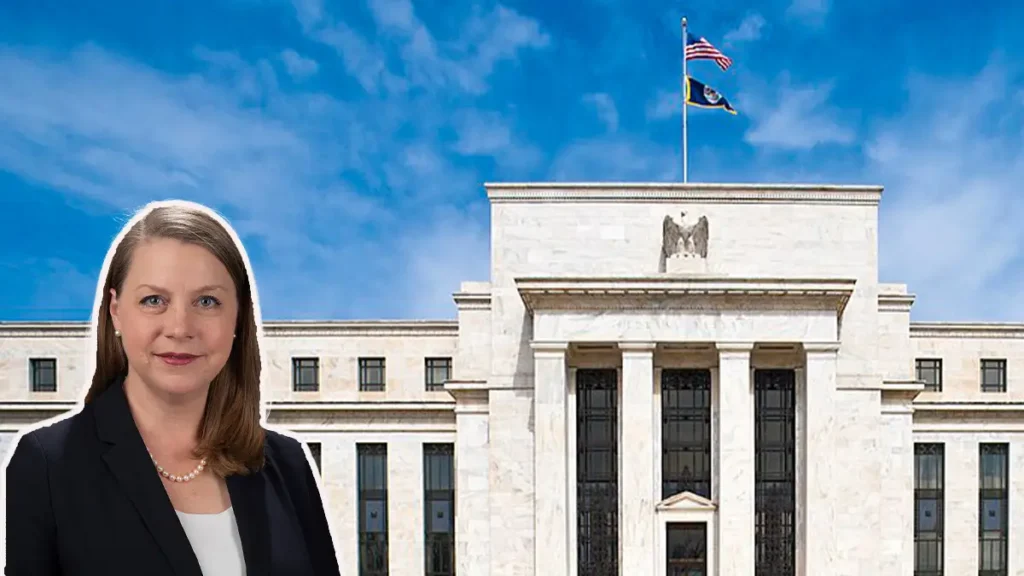On Tuesday, Fed governor Michelle Bowman expressed concern about proposed US bank reforms. She believes that federal officials are going beyond what the law intended.
Furthermore, Bowman pointed out that the US bank reforms could cause problems for banks and might not achieve their goal of a stronger financial system. This has sparked a heated debate.
Michelle Bowman’s views on US Bank reforms
Regarding US bank reforms, Bowman emphasized the importance of the Federal Reserve’s independence.
She expressed concerns that some actions might not fully meet this goal. Amid growing doubts about public institutions, she urged the Fed to uphold its statutory duties with unwavering commitment.
Bowman is also known for representing community banks. She directed her criticism at a whopping 5,000 pages of proposed changes to US bank reforms.
Her concerns extended to the proposed adjustments in the Community Reinvestment Act and the suggested increase in banking capital requirements.
Furthermore, she’s worried that a suggested limit on interchange fees might lead to increased consumer borrowing expenses.
Bowman also scrutinized the Federal Reserve Board’s pilot climate-scenario program, currently in progress with six of the largest US banks, describing it as costly and challenging to put into action.
Regarding bank capital requirements, Bowman stated that the US financial system is already robust and resistant without them.
She expressed skepticism about claims that the proposal’s benefits outweigh its costs.
Bowman also talks about CRA at the Ohio Bankers League
Bowman affirmed her support for the Community Reinvestment Act’s mission of increasing lending in low- and moderate-income areas.
However, she cautioned that the proposed regulations could unfairly burden community banks.
Though the US bank reforms brought about several positive alterations, the agencies may have gone beyond the authority granted by the CRA statute, according to Bowman.
She further noted that the US bank reforms are needlessly complicated, overly detailed, and lead to outcomes where the costs outweigh the benefits.
Bowman delivered these remarks during the 2023 Ohio Bankers League meeting in Columbus, Ohio. It’s worth noting that Bowman and Chris Waller are the sole Fed governors appointed during the Trump administration.
It is not the first time she has opposed the reforms
Notably, in October, while addressing the audience in Morocco, Bowman highlighted that regulatory reform can carry substantial financial stability risks.
She emphasized the risk can be substantial, especially when changes do not consider incentive effects and potential outcomes.
She also noted that regulatory actions could dampen economic activity by limiting credit availability, citing the potential impact of the regulators’ Basel III Endgame proposal.
Bowman stressed the importance of banking regulators ensuring that adjustments to the regulatory framework do not endanger the long-term sustainability of banks, especially mid-sized and smaller ones.
Navigating capital requirements and banking risks in 2023
After the banking failures in March 2023, US regulators are considering imposing higher capital requirements on banks with assets exceeding $100 billion.
However, this decision is perplexing, as some of the most reckless risk-taking has been observed among smaller banks.
While some of the suggested changes, like including unrealized gains and losses from specific securities in capital ratios, are long-awaited, most CEOs of large banks are not satisfied with the proposals.
Michelle Bowman’s stance on rate hikes and economic data evaluation
Other than her comments on bank reforms, Bowman reiterated her belief that the US central bank will probably need to increase short-term interest rates in the future.
However, for the moment, she’s satisfied with evaluating the data and its implications for the economic outlook.
“I am ready to back an increase in the federal funds rate at a forthcoming meeting if the incoming data shows that progress on inflation is slowing or not adequate to reach the 2% target in a timely manner,”
Bowman stated in her prepared remarks for the Ohio Bankers League meeting.
Read More: Bank of America and Deutsche Bank See Fed Rate Cuts in 2024

